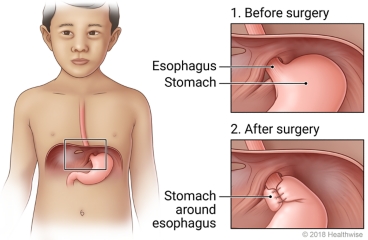What is fundoplication?

This surgery is done to treat gastroesophageal reflux disease (GERD) or respiratory problems related to acid reflux. The doctor strengthens the valve between the stomach and the esophagus. The esophagus is the tube that connects the throat to the stomach.
The doctor wraps the upper part of the stomach (fundus) around the lower part of the esophagus. This prevents stomach acid from moving back into the esophagus. After surgery, your child should have fewer symptoms of GERD, such as heartburn.
This is usually a laparoscopic surgery. This means that the doctor makes small cuts in your child's belly to do the surgery. These cuts are called incisions. The doctor puts a lighted tube, or scope, and other surgical tools through the incisions. The doctor is able to see your child's organs with the scope.
This surgery can also be done with an endoscope that is passed through the mouth (transoral incisionless fundoplication, or TIF).
The doctor may do an open surgery instead. This means that the doctor makes a larger incision in the middle of your child's belly.
Your child will probably stay in the hospital for 3 to 5 days after surgery. After laparoscopy, most children can go back to doing their usual activities in 2 to 3 weeks. The recovery time after endoscopy (TIF) surgery is about the same or slightly less. If your child has open surgery, it may take a little longer to recover.
The type of surgery your child has depends on your child's health needs. The incisions from laparoscopic surgery and open surgery leave scars that fade over time.
How do you prepare for surgery?
Surgery can be stressful for both your child and you. This information will help you understand what you can expect. And it will help you safely prepare for your child's surgery.
Preparing for surgery
- Talk to your child about the surgery. Say that it will help your child have fewer symptoms of GERD. Hospitals know how to take care of children. The staff will do all they can to make it easier for your child.
- Ask if a special tour of the surgery area and hospital is available. This may make your child feel less nervous about what happens.
- Plan for your child's recovery time. Your child may need more of your time right after the surgery, both for care and for comfort.
- Understand exactly what surgery is planned, along with the risks, benefits, and other options.
- Tell the doctor ALL the medicines, vitamins, supplements, and herbal remedies your child takes. Some may increase the risk of problems during the surgery. Your doctor will tell you if your child should stop taking any of them before the surgery and how soon to do it.
The day before surgery
- A nurse may call you (or you may need to call the hospital). This is to confirm the time and date of your child's surgery and answer any questions.
- Remember to follow your doctor's instructions about your child taking or stopping medicines before surgery. This includes over-the-counter medicines.
What happens on the day of surgery?
- Follow the instructions exactly about when your child should stop eating and drinking. If you don't, your child's surgery may be canceled. If your doctor told you to have your child take any medicines on the day of surgery, have your child take them with only a sip of water.
- Follow the doctor's instructions about when your child should bathe or shower before the procedure. Do not apply lotion or deodorant.
- Your child may brush their teeth. But tell your child not to swallow any toothpaste or water.
- Do not let your child wear contact lenses. Bring your child's glasses or contact lens case.
- Be sure your child has something that's a reminder of home. A special stuffed animal, toy, or blanket may be comforting. For an older child, it might be a book or music.
At the hospital
- A parent or legal guardian must accompany your child.
- The area for surgery is often marked to make sure there are no surgical site errors.
- Your child will be kept comfortable and safe by the anesthesia provider. Your child will be asleep during the surgery.
- The surgery will take about 1 to 2 hours.
- After surgery, your child will be taken to the recovery room. As your child wakes up, the recovery staff will monitor your child's condition. The doctor will talk to you about the surgery.
When should you call your doctor?
- You have questions or concerns.
- You don't understand how to prepare your child for surgery.
- Your child becomes ill before the surgery (such as fever, flu, or a cold).
- You need to reschedule or have changed your mind about your child having the surgery.
Where can you learn more?
Go to http://www.healthwise.net/patientEd
Enter N299 in the search box to learn more about "Fundoplication: Before Your Child's Surgery".
Current as of: October 1, 2025
Author: Ignite Healthwise, LLC Staff
Clinical Review Board
All Ignite Healthwise, LLC education is reviewed by a team that includes physicians, nurses, advanced practitioners, registered dieticians, and other healthcare professionals.

